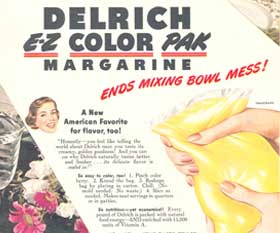The United States Used to Have More Laws Concerning Margarine than Hate Crimes
The margarine and dairy industries have been at war since the late 1800s when the lower-cost butter substitute was first invented.
Early on, butter manufacturers believed that if margarine ever became popular it might cut into their sales significantly. And they were right. In order to fight the new product, the dairy industry set out to restricts availability and undercut its appeal in both the courtroom and Capitol Hill.
Dairy industry lobbyists worked both in individual states and also on a federal basis to fight the emerging margarine industry. Congress passed the Margarine Act of 1886, which put a two cent tax on the product, as well as restricted its sale and manufacture.

Above: An advertisement for do-it-yourself margarine coloring, 1948.
By contrast, both federal and statewide hate crimes laws are a relatively new invention, with the first federal hate crimes legislation being enacted in the 1990s. To this day, the National Association of Margarine Manufacturers website still refers to the dairy industry as “dairy militants.”
2 comments on “The United States Used to Have More Laws Concerning Margarine than Hate Crimes”
Comments are closed.

That date in the caption for the picture of 1848 is off by 100 years.
You’re so right, thank you for catching that. Fixed.